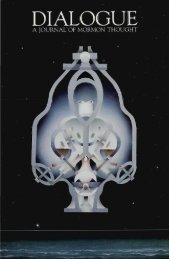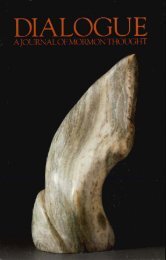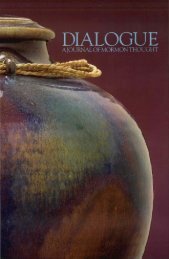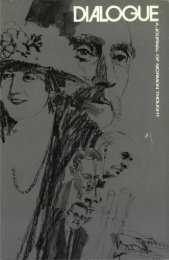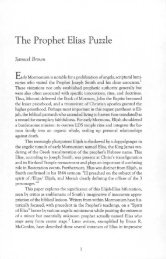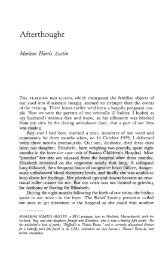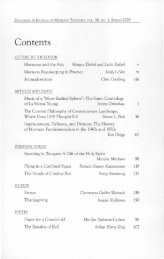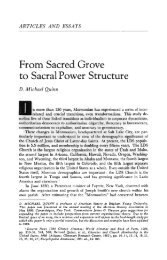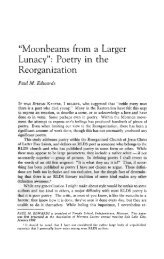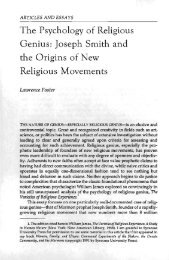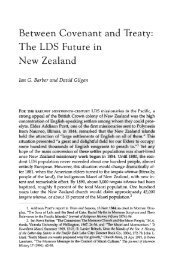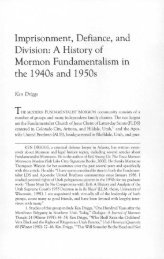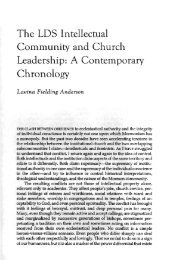Dialogue, Volume 25, Number 2 - Dialogue – A Journal of Mormon ...
Dialogue, Volume 25, Number 2 - Dialogue – A Journal of Mormon ...
Dialogue, Volume 25, Number 2 - Dialogue – A Journal of Mormon ...
You also want an ePaper? Increase the reach of your titles
YUMPU automatically turns print PDFs into web optimized ePapers that Google loves.
White: Making Sense <strong>of</strong> Suffering 115<br />
Kushner concluded that strength comes by turning to God. I wholeheartedly<br />
agree and would add that strength and miracles also come<br />
from long discussions with caring, supportive people — whether it be<br />
friends, relatives, or medical pr<strong>of</strong>essionals. Once, when I felt I just<br />
couldn't hang on any longer because <strong>of</strong> the continuous ringing in my<br />
ears, Lee encouraged me to "dig deeper" than I ever had before to find<br />
the resources to deal with physical and emotional pain. That conversation,<br />
probably as much or more than the blessings, helped me cope.<br />
I also discovered that there are some facets <strong>of</strong> my illness I can<br />
control and some I can't. I can strive for peace <strong>of</strong> mind even though I<br />
am panicked. I can choose to be loving instead <strong>of</strong> embittered. But I<br />
have less or no control over what the disease does to my body. Special<br />
diets, primrose oil, and visualization didn't work well for me. I couldn't<br />
stop my ears from ringing or my head from spinning. And I came to<br />
the realization that more faith, more family home evenings, daily scripture<br />
reading, or more dedicated visiting teaching wouldn't have made<br />
any difference to the progress <strong>of</strong> the disease. Those are good things to<br />
have and do, and I want to be diligent. But I don't believe there's a<br />
direct link between a checklist and a conduit to heaven.<br />
I'm also getting more comfortable with the notion that I will never<br />
completely make sense <strong>of</strong> the suffering I see in the world. Life is not<br />
fair, and there are myriad shades <strong>of</strong> gray. The pressing question<br />
becomes, can I accept the ambiguity and vulnerability <strong>of</strong> this life without<br />
needing absolute, comprehensive answers? Since I'm not a very<br />
patient person, it is hard for me to accept the waiting and uncertainty<br />
which this position imposes. But I also cannot accept the converse,<br />
dogmatic position that <strong>Mormon</strong>s have the answers to all <strong>of</strong> life's complexities<br />
and a monopoly on truth. Can we as thoughtful, believing<br />
<strong>Mormon</strong>s be content with not having answers to everything? I hope so.<br />
I have emerged from this ordeal convinced that God does not grant<br />
us life with a full script from start to finish. We need to define the<br />
meaning <strong>of</strong> our lives according to our individual experiences. We not<br />
only experience life differently; we interpret our life experiences differently.<br />
But it is that interpretation which strengthens our individuality<br />
and defines our very being.<br />
Gilda Radner, during her struggle with cancer, wrote:<br />
I wanted a perfect ending, so I sat down to write the book with the ending in<br />
place before there even was an ending. Now I've learned, the hard way, that some<br />
poems don't rhyme, and some stories don't have a clear beginning, middle and<br />
end. Like my life, this book has ambiguity. Like my life, this book is about not<br />
knowing, having to change, taking the moment and making the best <strong>of</strong> it, without<br />
knowing what's going to happen next. Delicious ambiguity, (p. 268)



